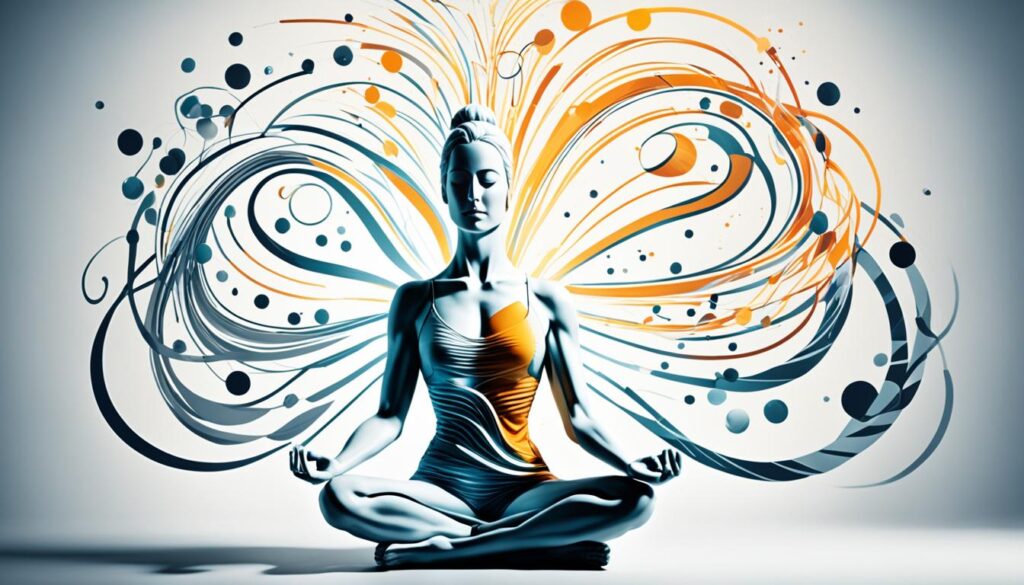Have you ever felt overwhelmed by the constant rush of daily life, always on the go, and feeling disconnected from your inner voice? I definitely have. In the fast-paced nature of our modern world, it’s easy to get caught up in the chaos and lose touch with our intuition.
But what if I told you that there is a way to reconnect with your inner wisdom and make decisions that align with your true desires? It starts with one simple act: being in stillness.
Being in stillness doesn’t mean sitting in complete silence or shutting out the world. It’s about creating moments of quiet reflection, where you can listen to the whispers of your intuition and tap into your deepest insights. It’s in these moments that we truly find clarity and guidance.
When we take the time to pause and be present, we open ourselves up to a world of possibilities. We become attuned to our inner voice, our intuition, and the wisdom that resides within us. We become more aware of what truly matters to us and what path is right for us.
So let’s take a moment right now to be still. Close your eyes, take a deep breath, and tune in to the gentle whispers of your intuition. What do you hear? What insights are waiting to be discovered?
Key Takeaways:
- Being in stillness allows us to tap into our intuition and gain clarity.
- By pausing and being present, we can make informed decisions that align with our true desires.
- Being in stillness is not about shutting out the world, but creating moments of quiet reflection.
- Listening to our intuition helps us become more aware of what truly matters to us and what path is right for us.
- Take a moment to be still and listen to the gentle whispers of your intuition.
The Importance of Listening to Your Intuition
Our intuition is a powerful tool that can guide us towards what is truly best for us. By listening to our inner voice, we can tap into our deepest desires, make decisions that align with our values, and find greater fulfillment in life.
However, in our fast-paced and busy world, it can be easy to overlook the wisdom of our intuition. We are bombarded with external distractions and influenced by societal expectations, causing us to question the validity of our inner knowing.
But here’s the truth: our intuition is a wellspring of inner wisdom that can lead us on the right path. It speaks to us in subtle whispers, offering guidance and insights that our rational minds may not always comprehend.
“Intuition is a spiritual faculty and does not explain, but simply points the way.”
– Florence Scovel Shinn
By trusting and listening to our intuition, we can gain clarity, make decisions with confidence, and live a life that is authentic to who we truly are.
Benefits of Listening to Your Intuition
When we prioritize listening to our intuition, we open ourselves up to a host of transformative benefits:
| Benefits of Listening to Your Intuition |
|---|
| 1. Enhanced decision-making |
| 2. Alignment with your true desires |
| 3. Increased self-trust |
| 4. Greater fulfillment and happiness |
| 5. Deeper connection to your authentic self |
| 6. Improved relationships and communication |
| 7. Heightened sense of purpose and direction |
Embracing the importance of listening to your intuition is a powerful step toward personal growth, self-discovery, and leading a life that is aligned with your true essence.
The Influence of Childhood Conditioning on Ignoring Intuition
Our childhood experiences and upbringing shape our beliefs and behaviors, including how we relate to our intuition. The messages we receive from our parents and society can condition us to ignore our inner voice and prioritize external validation. This conditioning can have a profound impact on our ability to hear and trust our intuition.
During our formative years, we learn what is considered right and wrong, desirable or undesirable. We internalize societal norms and beliefs, often at the expense of our own intuition. When we’re constantly seeking approval and acceptance from others, we may suppress our intuitive guidance to fit in and conform.
This conditioning is deeply rooted and can manifest in various ways. It can erode our self-esteem and create self-doubt, making it difficult to trust our own judgment. We may second-guess ourselves and rely on external validation instead of listening to our inner voice.
“Childhood conditioning can lead us to override or ignore our intuition in favor of fitting in and seeking external validation.”
The Impact on Self-Esteem
One major consequence of childhood conditioning is its impact on our self-esteem. When we prioritize external validation over our own intuition, we diminish our sense of self-worth. We start relying on others to determine our value and make decisions for us, undermining our confidence in our own abilities and instincts.
Additionally, childhood conditioning can instill limiting beliefs that undermine our self-esteem. Messages like “your opinion doesn’t matter” or “you’re not smart enough to make your own choices” can create a deep-seated belief that our intuition is unreliable or irrelevant.
This erosion of self-esteem leads to a cycle of self-doubt and hesitation. We constantly seek reassurance and validation from others, fearing that our choices and actions are inadequate. This cycle perpetuates the pattern of ignoring our intuition and relying on external sources to guide our decisions.
The Journey to Overcoming Conditioning
Breaking free from childhood conditioning and learning to trust our intuition is a journey of self-discovery and self-empowerment. It requires us to challenge the beliefs and norms imposed upon us and reconnect with our authentic selves.
This journey often starts with self-reflection and questioning. We must examine the beliefs we hold and assess whether they align with our true desires and values. This process can be uncomfortable and require us to confront deep-seated conditioning, but it is necessary for growth and reclaiming our intuition.
Building self-esteem is vital in this journey. By acknowledging our worth and cultivating self-acceptance, we can begin to trust our intuition and make choices that align with our authentic selves. Self-care practices, such as mindfulness and positive affirmations, can help bolster our self-esteem and reinforce the belief in our own wisdom.
The Importance of Self-Validation
To overcome childhood conditioning and honor our intuition, we must learn the importance of self-validation. Instead of seeking validation from others, we can turn inward and rely on our own assessment of what feels right and true for us. This process requires self-trust and self-compassion.
When we validate ourselves, we reclaim our power and autonomy. We no longer look to external sources for validation and approval but trust our intuition to guide us on the right path. This shift allows us to make decisions with confidence and live a life true to ourselves.
| Effects of Childhood Conditioning on Ignoring Intuition | Ways to Overcome Childhood Conditioning and Embrace Intuition |
|---|---|
| 1. Diminished self-esteem | 1. Engage in self-reflection and questioning |
| 2. Relying on external validation | 2. Build self-esteem through self-care practices |
| 3. Suppression of intuition | 3. Cultivate self-trust and self-compassion |

Childhood conditioning can significantly impact our ability to hear and trust our intuition. By recognizing the influence of this conditioning and taking steps to overcome it, we can reclaim our inner wisdom and live a more authentic and fulfilling life.
The Journey to Stillness in Midlife
As we reach midlife, many of us begin to question our purpose, identity, and the meaning of our lives. This introspection often coincides with a desire to reconnect with our true selves and find stillness amidst the chaos. It is during this phase that we may start to unwind the conditioning we have accumulated and reawaken to the parts of ourselves that have been ignored.
Midlife is a period of profound self-exploration and transformation, where the need for quiet reflection becomes paramount. The journey to stillness in midlife involves diving deep into our core values, questioning societal norms, and shedding the layers of expectations that no longer serve us. It is an opportunity to examine our beliefs, reassess our priorities, and rediscover our passions.
This journey to stillness requires courage and a willingness to face the uncomfortable truths that may arise. It calls for a reevaluation of relationships, careers, and lifestyles, as we seek alignment with our authentic selves. The process can be both liberating and challenging, as we navigate through the uncertainties and uncertainties of midlife transitions.
During this transformative phase, many individuals turn to practices such as meditation, mindfulness, and self-reflection to cultivate inner stillness. These tools offer a refuge amidst the noise and provide a space for self-discovery and introspection. By embracing the journey to stillness in midlife, we open ourselves up to new possibilities, deep inner growth, and a greater sense of fulfillment.

In the quest for stillness, midlife presents an opportunity to realign our lives with our true purpose and passions. It is a time of reawakening, self-discovery, and personal evolution. By embracing the journey to stillness during this transformative phase, we gain profound insights, clarity, and a renewed sense of purpose.
Learning to Listen to Your Body’s Needs
One aspect of stillness involves paying attention to our body’s signals and honoring its needs. By cultivating a deeper awareness of our physical sensations and listening to what our body is telling us, we can better prioritize self-care and overall well-being.
Our bodies have a remarkable capacity to communicate with us, guiding us towards what they need to function optimally. Yet, in the hustle and bustle of everyday life, it’s easy to ignore or dismiss these signals. Taking the time to tune in allows us to reconnect with our bodies and establish a harmonious relationship with them.
When we listen to our body, it rewards us with a wealth of insight and wisdom. It guides us towards the activities, nourishment, and rest that will support our physical, mental, and emotional health.
Listening to our body’s needs goes beyond simply acknowledging them; it requires taking action. It means honoring the physiological needs that arise and making conscious choices to meet them. Whether it’s getting enough sleep, nourishing ourselves with nutritious food, hydrating adequately, or engaging in activities that promote relaxation, self-care becomes a priority.
By neglecting our body’s needs, we risk compromising our well-being. It’s essential to remember that our bodies are our partners on this journey of life, and caring for them allows us to show up fully in all aspects of our lives.
Listening to our body isn’t just about physical wellness—it also encompasses our mental and emotional well-being. The body often communicates through subtle sensations, feelings of discomfort, or even visceral reactions. Paying attention to these signals can provide valuable insight into our emotional state and help us better understand our needs.
Incorporating practices like mindfulness, meditation, and journaling can enhance our ability to listen to our body and uncover the deeper messages it holds. These practices create a space for introspection and self-reflection, allowing us to tap into our intuition and gain a deeper understanding of ourselves.

Benefits of Listening to Your Body
When we listen to our body and respond with care, we experience a range of benefits that contribute to our overall well-being.
| Benefits | Details |
|---|---|
| Improved Physical Health | By meeting our body’s physiological needs, we support optimal functioning, improve energy levels, and enhance our immune system. |
| Enhanced Mental Clarity | Listening to our body helps us tune out distractions and find mental clarity, boosting focus, concentration, and cognitive performance. |
| Emotional Well-being | Understanding our body’s cues allows us to honor our emotional needs, fostering greater emotional resilience and well-being. |
| Stress Reduction | Responding to our body’s signals helps us manage stress effectively, promoting a sense of calm, inner balance, and emotional stability. |
| Improved Self-Care | Listening to our body encourages us to prioritize self-care, fostering a deeper connection with ourselves and nurturing our overall health and happiness. |
By prioritizing the art of listening to our body and meeting its needs, we embark on a journey of self-discovery, self-care, and profound well-being.
Embracing Acceptance for self development
In our personal growth and self-discovery journey, acceptance is a cornerstone that propels us forward. By surrendering to the present moment and relinquishing our need for control, we open ourselves up to a wealth of new possibilities and deeper understanding. Embracing acceptance allows us to cultivate compassion for ourselves and others, leading to profound self-development and personal transformation.
Acceptance is not synonymous with resignation; it is an active choice to acknowledge and embrace reality as it is. It is about releasing the resistance and judgment that often hold us back, enabling us to tap into our inner strength and wisdom. When we accept ourselves unconditionally, including our flaws and imperfections, we pave the way for growth and healing.
“Acceptance is the first step towards positive change. It gives us the clarity and freedom to move beyond self-imposed limitations and step into our full potential.”
Through acceptance, we learn to let go of the past, freeing ourselves from the burdens of regret and resentment. It allows us to forgive ourselves and others, fostering a sense of inner peace and liberation. By embracing acceptance, we cultivate a mindset that is open to learning from our experiences and embracing the lessons they offer.
Acceptance also plays a vital role in harnessing the power of surrender. Surrendering doesn’t mean giving up or being passive; it means releasing our attachment to specific outcomes or expectations. It is about trusting the process of life and surrendering to the divine flow of the universe. When we surrender, we create space for miracles to unfold and serendipitous opportunities to arise.
Embracing acceptance empowers us to step out of our comfort zones and face our fears head-on. It encourages self-exploration and self-discovery, as we open ourselves up to new experiences and perspectives. By accepting ourselves as a work in progress, we embrace the beauty of continuous growth and development.
Cultivating Acceptance in Daily Life
Here are some practical ways to cultivate acceptance in our daily lives:
- Practice self-compassion and self-care: Treat yourself with kindness and prioritize your well-being.
- Be mindful of your thoughts and emotions: Notice when self-judgment or resistance arises, and gently redirect your focus towards acceptance and compassion.
- Engage in meditation or mindfulness practices: These practices help cultivate present-moment awareness and acceptance of what is.
- Embrace uncertainty: Learn to tolerate the discomfort that comes with uncertainty and trust in the process of life.
- Surround yourself with supportive and accepting individuals: Cultivate relationships with people who encourage and accept you as you are.

In conclusion, embracing acceptance is a powerful catalyst for self-development and personal growth. By surrendering to the present moment, letting go of control, and embracing what is, we open ourselves up to new insights, possibilities, and a deeper understanding of ourselves. Practicing acceptance not only invites profound positive transformation, but it also fosters greater inner peace and a more fulfilling life.
Embracing Discomfort for Growth
Embracing discomfort is a vital component of our journey towards self-development and personal growth. While stepping out of our comfort zones may feel intimidating, it is through facing challenges head-on that we discover our true potential and unlock new opportunities for growth.
When we choose to embrace discomfort, we open ourselves up to experiences that expand our horizons and push us beyond our perceived limits. By challenging ourselves and venturing into the unknown, we begin to develop resilience and adaptability, traits that are essential for navigating the ever-changing landscape of life.
Stepping out of our comfort zones allows us to discover hidden strengths and capabilities that we may not have known existed. It is in these moments of discomfort and uncertainty that we truly learn about ourselves and our ability to overcome obstacles.
Embracing discomfort also stimulates our creativity and innovation. When faced with unfamiliar situations, our minds are forced to think outside the box and find new solutions. This creative problem-solving not only leads to personal growth but also fosters a sense of empowerment and confidence in our own abilities.

It is important to remember that growth and self-development require us to step outside of our comfort zones on a regular basis. By choosing comfort over expansion, we limit our potential and hinder our progress. Embracing discomfort is an invitation to lean into the unknown, to trust the process, and to uncover the transformative gifts that lie on the other side.
The Rewards of Embracing Discomfort:
- Increased self-confidence and self-belief
- Expanded knowledge and skills
- Enhanced problem-solving abilities
- Greater adaptability and resilience
- Discovery of hidden strengths and talents
“Life begins at the end of your comfort zone.” – Neale Donald Walsch
Embracing discomfort is not about seeking constant discomfort or pushing ourselves to our breaking point. It is about finding the balance between challenging ourselves and nurturing our well-being. By embracing discomfort in a mindful and intentional way, we can embark on a transformative journey of self-discovery, growth, and personal fulfillment.
The Power of Stillness in Creativity and Inspiration
Stillness is a powerful catalyst for unlocking our creative potential and finding inspiration. When we embrace the power of stillness, we create the space for our minds to quiet down and open up to new ideas and insights. By letting go of external distractions and immersing ourselves in the present moment, we tap into a state of flow where creativity flourishes.
“Creativity takes courage.” – Henri Matisse
In the stillness, our minds are freed from the constant chatter and busyness that often hinder our creative process. We become more receptive to the subtle nuances and hidden connections that lie beneath the surface. It is in this silence that breakthrough ideas are born and new paths are discovered.
When our minds are quiet and our thoughts are no longer racing, we create space for inspiration to flow in. We become attuned to our inner voice and the wisdom that lies within us. The power of stillness allows us to access our deepest emotions, desires, and dreams, providing the fuel for our creative endeavors.
Just like a painter standing in front of a blank canvas, embracing stillness allows us to step into a realm of limitless possibilities. It is in this space of stillness that the colors blend and the brushstrokes take shape, giving birth to a masterpiece of our own making.
When we honor the power of stillness in our creative process, we give ourselves permission to explore without judgment and to play without limitations. It is in these moments of quiet reflection that we find the courage to take risks, to think outside the box, and to push the boundaries of what is possible.
Incorporating stillness into our daily lives can be as simple as finding a quiet corner to meditate, taking a leisurely stroll in nature, or immersing ourselves in a favorite creative activity. The key is to create regular moments of stillness that allow us to recharge, reset, and reconnect with our creative spirit.

Let us embrace the power of stillness in our journey of creativity and inspiration. By quieting the noise around us and tuning in to our inner selves, we unlock the boundless wellspring of creativity that resides within each of us.
The Benefits of Stillness in Creativity and Inspiration
| Benefits | Description |
|---|---|
| Increased focus | Stillness allows us to concentrate our attention on one task at a time, enhancing our ability to dive deep into our creative process. |
| Heightened imagination | The quiet space of stillness gives rise to a vivid imagination, enabling us to envision new possibilities and unconventional ideas. |
| Enhanced problem-solving | By embracing stillness, we create mental clarity that enables us to approach challenges with fresh perspectives and innovative solutions. |
| Emotional healing | Stillness provides a nurturing environment for emotional healing, allowing us to process and release any blockages that may be inhibiting our creative expression. |
| Heightened self-awareness | When we immerse ourselves in stillness, we develop a deeper understanding of ourselves, our desires, and our unique creative voice. |
Embracing the power of stillness in our lives is an invitation to tap into the infinite wellspring of creativity and inspiration that resides within each of us. Let us find moments of quiet, create space for our creative selves to thrive, and allow the magic of stillness to guide us on our creative journeys.
The Mind-Body Connection in Stillness
The mind and body are intricately connected, and nurturing this connection through the practice of stillness can have profound effects on our overall well-being. When we take the time to cultivate a state of internal quiet and calm, we create a harmonious balance between our mental and physical selves. This section explores the mind-body connection and the significant benefits that come from incorporating stillness into our daily lives.
In our modern world filled with constant stimulation and distractions, it’s essential to recognize the importance of finding moments of stillness and allowing ourselves to reset and recharge. By engaging in practices such as meditation, we can quiet the mind and bring our attention into the present moment.

Through meditation, we activate the parasympathetic nervous system, which promotes relaxation and alleviates the harmful effects of chronic stress. Studies have shown that regular meditation practice can reduce stress, lower blood pressure, and improve sleep quality.
The Benefits of Stillness on Well-Being
When we prioritize stillness in our lives, we create a space for self-reflection and introspection. This intentional pause allows us to gain clarity, reduce anxiety, and deepen our self-awareness. By tuning in to the present moment, we can better understand our emotions, thoughts, and physical sensations, leading to a greater sense of overall well-being.
“In the stillness, we find the answers we seek, the peace we crave, and the connection to ourselves and the world around us.”
Practicing stillness also enhances our ability to focus and concentrate, improving our mental clarity and productivity. By training ourselves to quiet the constant chatter of the mind, we create space for creativity and innovation.
The Role of Meditation in Cultivating Stillness
Meditation serves as a powerful tool for cultivating stillness and deepening the mind-body connection. During meditation, we bring our attention to the present moment, focusing on our breath, sensations, or a particular object of focus. This practice allows us to quiet our internal dialogue and detach from the thoughts that often occupy our minds.
Meditation can be done in various forms, including seated meditation, walking meditation, or guided meditation. The key is to find a method that resonates with you and make it a regular part of your routine.
“In the stillness of meditation, we find solace, clarity, and a profound connection to our inner selves.”
Adding Stillness to Our Daily Lives
Incorporating stillness into our daily lives doesn’t require large blocks of time or drastic changes to our routines. It’s about finding moments throughout the day to pause, breathe, and reconnect with ourselves.
Here are a few simple ways to bring stillness into your everyday life:
- Start your day with a few minutes of quiet reflection or meditation.
- Take short breaks throughout the day to step away from screens and engage in deep breathing or gentle stretching.
- Make time for activities that bring you joy and allow you to enter a state of flow, such as reading, painting, or gardening.
- Engage in mindful movement practices like yoga or tai chi.
By consciously creating moments of stillness and presence, we can cultivate a deeper connection to ourselves and experience an enhanced sense of well-being in our daily lives.
The Power of Reading for Stillness
Reading is a wonderful way to experience stillness in our fast-paced world. It allows us to disconnect from the noise around us and immerse ourselves in the present moment. When we pick up a book, our attention becomes focused, and we enter a state of calm and mindfulness.
Through reading, we have the opportunity to engage our imagination and explore new worlds. Whether it’s a captivating novel, an inspiring self-help book, or an informative non-fiction piece, reading expands our knowledge and opens our minds to different perspectives. It takes us on a journey of self-discovery and introspection, leading us to profound insights and personal growth.
The act of reading itself demands our full attention, requiring us to be fully present in the moment. As we turn the pages and delve into the words, we enter a state of flow where time seems to stand still. This stillness allows us to escape the distractions of everyday life and find solace in the words of others.

Reading is an act of stillness that allows us to discover the beauty and wisdom that lie within the pages of a book.
Whether we choose fiction, poetry, or any other genre, reading offers us a moment of tranquility and reflection. It nourishes our minds, sparks our creativity, and provides an opportunity for self-reflection. In the silence of reading, we can find comfort, inspiration, and a deeper connection to ourselves.
The Benefits of Reading for Stillness
Reading not only promotes stillness but also brings numerous benefits to our overall well-being:
| Benefits of Reading | |
|---|---|
| 1. Stress reduction: | Reading transports us to a different world, helping us escape from the stresses of daily life and providing a much-needed mental break. |
| 2. Improved focus: | The concentration required while reading strengthens our focus and attention span, allowing us to be more present in other areas of our lives. |
| 3. Emotional well-being: | Books can evoke a range of emotions, such as joy, empathy, and inspiration, promoting emotional intelligence and well-being. |
| 4. Intellectual growth: | Reading expands our knowledge, enhances our vocabulary, and stimulates our critical thinking skills, contributing to lifelong learning. |
| 5. Mindfulness practice: | The stillness experienced while reading aligns with the principles of mindfulness, allowing us to cultivate awareness and presence. |
By incorporating reading into our daily lives, we can tap into the power of stillness and nurture our mind, body, and soul. So, grab a book, find a cozy spot, and let the magic of reading transport you to a place of peace and serenity.
Finding Stillness through Self-Expression
Engaging in activities that allow us to express ourselves authentically is a powerful way to enter a state of stillness. When we tap into our self-expression, whether it’s through writing a heartfelt poem, painting a vibrant canvas, or playing a soul-stirring melody, we create a space for inner exploration and connection to our true selves.
In these moments of creative flow, the noise of the outside world fades away, and we find ourselves fully present in the act of self-expression. It’s as if time stands still, and our attention becomes focused solely on the process of bringing our inner world into external form. This state of stillness allows us to tap into our unique perspectives, emotions, and experiences, giving them a voice and shape.
“Through self-expression, we unveil the depths of our being, revealing our thoughts, desires, joys, and vulnerabilities. It’s a sacred act of honoring our individuality and embracing our true essence.”
Self-expression is not limited to traditional artistic endeavors; it encompasses any activity that allows you to communicate your thoughts, feelings, and ideas authentically. It can be as simple as journaling your deepest thoughts or engaging in a lively debate with friends. The key is to find the form of expression that resonates with you and nurtures your sense of self.
When we engage in self-expression, we create a safe haven for self-discovery and self-acceptance. It’s a chance to navigate the labyrinth of our experiences, emotions, and beliefs, allowing us to gain a better understanding of who we are and what truly matters to us. It’s through this journey of self-exploration that we can find clarity, purpose, and a deep sense of fulfillment.
So, whether you find solace in the strokes of a paintbrush, the dance of words on a page, or the melody of your favorite instrument, embrace the power of self-expression. Allow it to guide you to that place of inner stillness, where your creativity thrives, and your true self finds its voice.

The Role of Adventures in Stillness
Embarking on new adventures and exploring unfamiliar territories can bring us into the present moment and evoke a sense of stillness. These experiences challenge us, push us out of our comfort zones, and allow us to see the world in new ways. The thrill of adventures ignites a spark of curiosity and exploration that can quiet the mind and bring a heightened awareness of the present moment.
When we venture into the unknown, we let go of the familiar routine and embrace the uncertainty of the journey. Whether it’s hiking through a dense forest, backpacking in a foreign country, or diving into the deep blue sea, adventures open up opportunities for self-discovery and personal growth.
Adventures create a space where we can let go of expectations and surrender to the flow of the experience. The rush of adrenaline, the awe-inspiring landscapes, and the encounters with new people and cultures all contribute to a profound sense of awe and gratitude. These moments of awe and gratitude bring us into the present moment, where we can fully immerse ourselves in the beauty and wonder of the world around us.

Through adventures, we learn to trust ourselves and expand our comfort zones. We face challenges and overcome obstacles, proving to ourselves that we are capable of more than we ever imagined. These moments of triumph and accomplishment foster a sense of empowerment and build resilience.
“Adventure is worthwhile in itself.” – Amelia Earhart
Even the smallest adventures, like exploring a new neighborhood or trying a new activity, can contribute to our overall sense of stillness and well-being. By stepping outside of our daily routines and embracing adventures, we invite a sense of curiosity, excitement, and joy into our lives.
Adventures and Self-Reflection
Adventures provide an opportunity for introspection and self-reflection. As we navigate unfamiliar terrain and encounter new experiences, we are challenged to confront our fears, biases, and limiting beliefs. This process of self-discovery allows us to gain a deeper understanding of ourselves and our place in the world.
We can take moments of stillness amidst the adventures to reflect on our experiences, thoughts, and emotions. These moments provide clarity and help us gain insights into who we are and what truly matters to us. It is in these moments of self-reflection that we find solace, inspiration, and a renewed sense of purpose.
The Transformative Power of Embracing the Unknown
Embracing the unknown through adventures can be a transformative experience. Stepping outside of our comfort zones and immersing ourselves in unfamiliar environments fosters personal growth and self-discovery. We learn to adapt, be flexible, and embrace the beauty of uncertainty.
Adventures teach us that growth happens outside of our comfort zones and that there is great value in embracing the unknown. The resilience, courage, and confidence we gain through adventures extend beyond the experience itself and positively impact our lives in various aspects.
So, let us embrace the call of adventure and discover the stillness that lies within the thrill of exploration. Through adventures, we can awaken our senses, expand our perspectives, and find a profound sense of stillness in the present moment.
Conclusion: Embrace Stillness to Unlock Inner Wisdom
Stillness is not just a state of quietude; it is a gateway to accessing our inner wisdom and clarity. When we embrace stillness in our lives, we create space to listen to our intuition and gain profound insights that guide us towards a fulfilled and purposeful life.
One powerful way to incorporate stillness is through the practice of meditation. By intentionally sitting in silence and observing our thoughts, we cultivate a sense of presence and connect with our innermost selves. In this stillness, we can discern the whispers of our intuition, helping us make choices that align with our authentic selves.
Another way to embrace stillness is through self-reflection. Taking the time to introspect and examine our thoughts, feelings, and experiences can provide clarity and a deeper understanding of ourselves. Through journaling, we can uncover patterns, identify limiting beliefs, and gain insights that lead to personal growth and self-discovery.
Engaging in activities that bring us joy is also a pathway to stillness. When we immerse ourselves in activities like art, music, or nature, we enter a state of flow where our minds become quiet, and time seems to slip away. In these moments, we connect with our inner wisdom and experience a sense of peace and fulfillment.
In embracing stillness, we unlock our inner wisdom and gain clarity that illuminates our path forward. By listening to our intuition and aligning our choices with our authentic selves, we can create a life of purpose, joy, and fulfillment. Embrace stillness, listen to your intuition, and discover the profound insights that lead to a truly meaningful existence.
FAQ
What is stillness, and how does it relate to hearing our intuition?
Stillness refers to a state of calm and quietude, both externally and internally. It is a state of being present in the moment and creating space to listen to our inner voice and intuition. By practicing stillness, we can cultivate a deeper connection with ourselves and tap into our intuition, leading to greater clarity and insight.
Why is it important to listen to our intuition?
Listening to our intuition allows us to tap into our inner wisdom and make decisions that align with our values and desires. Our intuition is a powerful tool that can guide us towards what is truly best for us and bring greater fulfillment and authenticity into our lives.
How does childhood conditioning influence our ability to hear and trust our intuition?
Childhood conditioning plays a significant role in shaping our beliefs and behaviors. Messages we receive from our parents and society can affect how we relate to our intuition. If we were taught to prioritize external validation and fitting in, we may override or ignore our intuition. It takes self-awareness and unraveling our conditioning to reconnect with and trust our intuition.
What role does stillness play in midlife and the journey to self-discovery?
Midlife often brings a period of introspection and a desire to reconnect with our true selves. Stillness becomes crucial in this phase as we unwind the conditioning we have accumulated and rediscover parts of ourselves that have been neglected. It is during this journey that we often find stillness and gain a deeper understanding of ourselves.
How does listening to our body’s needs contribute to stillness?
Paying attention to our body’s signals and honoring its needs is an essential part of stillness. By cultivating awareness of our physical sensations and listening to what our body is telling us, we can prioritize self-care and overall well-being. This deepens the connection between mind and body and facilitates a state of calm and balance.
Why is acceptance important for self-development?
Embracing acceptance allows us to surrender to the present moment and let go of the need to control everything. By accepting ourselves and our circumstances, we open ourselves up to new possibilities and deeper understanding. This mindset shift promotes personal growth, resilience, and the ability to navigate life’s challenges with grace.
How does discomfort contribute to personal growth and self-development?
Stepping out of our comfort zones and embracing discomfort is often necessary for personal growth. By facing challenges and pushing ourselves beyond what is familiar, we expand our horizons, discover new strengths, and build resilience. Embracing discomfort can lead to transformative experiences and a greater sense of self-awareness.
How does stillness benefit creativity and inspiration?
Stillness provides fertile ground for creativity and inspiration to flourish. When we quiet the external noise and allow ourselves to be present in the moment, we tap into a state of flow where new ideas and insights can arise. Stillness fuels our creative energy and allows us to access our inner creative resources.
What is the connection between stillness and the mind-body connection?
Stillness has profound effects on our overall well-being through the mind-body connection. By cultivating a state of internal quiet and calm through practices like meditation, we reduce stress, improve focus, and enhance our physical health. Stillness promotes a harmonious relationship between the mind and body, leading to increased well-being.
How does reading contribute to stillness and mindfulness?
Reading is an act of stillness as it allows us to disconnect from the noise of the world and immerse ourselves in the present moment. Through reading, we engage our imagination, expand our knowledge, and find solace in the words of others. Reading cultivates mindfulness by encouraging us to be fully present and attentive to the written word.
How does self-expression relate to finding stillness?
Engaging in activities that allow us to express ourselves authentically is a powerful way to enter a state of stillness. Whether it’s through writing, painting, or any other creative outlet, self-expression provides an avenue for inner exploration and a connection to our true selves. Stillness supports and enhances the process of self-expression.
What role do adventures play in finding stillness?
Embarking on new adventures and exploring unfamiliar territories can bring us into the present moment and evoke a sense of stillness. These experiences challenge us, push us out of our comfort zones, and allow us to see the world in new ways. Adventures awaken our senses, heighten our awareness, and create an opportunity for stillness.
How can embracing stillness unlock inner wisdom and clarity?
Stillness is not just a state of quietude; it is a gateway to accessing our inner wisdom and clarity. By incorporating stillness into our lives through practices like meditation, self-reflection, and engaging in activities that bring us joy, we can align with our intuition and make choices that resonate with our authentic selves. Embracing stillness opens the door to profound insights and a fulfilled and purposeful life.
How Does Embracing Stillness and Calm Help in Hearing Your Intuition and Embracing Insight?
Embracing stillness and calm offers numerous benefits of practicing stillness, including enhancing the ability to hear one’s intuition and embrace insight. By quieting the mind and creating space for reflection, individuals can better connect with their inner wisdom and gain clarity on important decisions and life paths.
Source Links
- https://themindfulsteward.com/mindfulness/how-to-bring-stillness-to-your-life-and-why-you-should/
- https://www.linkedin.com/pulse/maria-potoroczyn-finding-stillness-listening-your-intuition-taylor
- https://medium.com/ancient-sages/embracing-stillness-unlocking-the-power-of-silence-and-mindfulness-70c658926ce0










